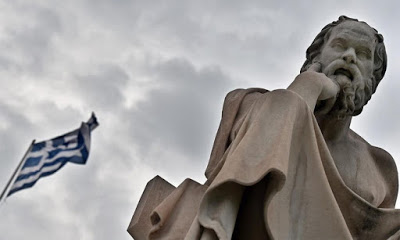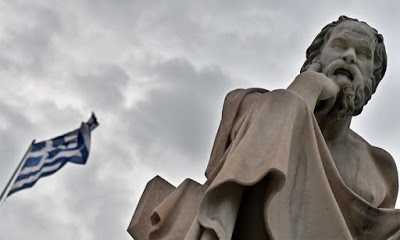Socrates, Confucius, Russell, Nietzsche and some other sacred monsters of philosophy knew what we insist on ignoring and remain unhappy or even compromised.
We rely on textbooks and happiness guides, we look for mottos that make our day and amulets that keep us away from evils and moments of misery and we ignore the obvious, what others - in minds far wider than ours - had discovered and shared with humanity. Who said that philosophy is just a boring science and not a compass to be happy in everyday life? What would Socrates think, for example, if he saw us drowning in a spoonful of water? What did Confucius consider as the quintessence of happiness? A look at what was believed about her - and her elusive - 9 of the greatest philosophers of all time, may change the way we deal with life and its (any) difficulties.
Bertrand Russell
"Of all the preventive measures we take, the most deadly and the one that kills our chance to be truly happy is to be protected from love." And that is what Russell, a lover of mathematics, science and rationalism, used to say, if anything.
Friedrich Nietzsche
"Happiness is the feeling that power is growing - that a resistance is being neutralized." The expected but interesting approach of the nihilist Nietzsche, who believed that happiness lies in the control one can exercise over one's environment and oneself. This feeling that one is in control of one's experiences guarantees a happy life, according to the philosopher always.
John Stewart Mill
"I have learned to seek happiness, limiting my desires, rather than trying to satisfy them." An approach expected from the father of liberalism, who when the conversation turned to personal life and a happy life, embraced more the ancient Greek ideals: commonly, his happiness had a limit, so that those around him could be happy.
Socrates
"The secret of happiness, you see, is not in seeking more, but in developing the skill of enjoying the least." For our Socrates, happiness was not a matter of external factors, but a product of internal processes. By taming the desire for more and more goods - or what everyone desires - we learn to appreciate the simple and true joys of life.
Confucius
"The more man meditates on the good, the better his world and the whole world will become." These from the philosopher who inspired the movement of positive thinking and behavioral psychology, who motivated humanity to seek the deeper connection of feelings, thoughts and behaviors. According to the Confucian theorem, happiness is just a prophecy that everyone fulfills for himself, discovering the deepest ideals that nurture his existence.
Seneca
"The greatest blessings of humanity are within us. The wise man is content with what he has, whatever it is, without praying for what he does not have. " The Stoic philosopher with sayings like this consolidated what in modern psychology we know as the control center of our desires. For the followers of his theory, this center lives forever and guides safely and wisely their movements as an inspired external force.
Lao Che
"If you feel sad you live in the past. If you are anxious, you live in the future. If you are peaceful, you live in the present ". One of the most important figures of Chinese philosophy, as early as the 6th century BC knew what we constantly say to ourselves - do we even believe it: live the moment. Modern psychology, adopting his view, argues that the happiest people are the ones who are committed to what they do, the moment they do it.
Soren Kierkegaard
"Life is not a problem to be solved, but a reality we have to experience." The Danish philosopher, theologian and poet, going a little further in Lao Tzu's thought, had to suggest the following: everything is treated better when we stop considering them problems, but experiences that we have to deal with somehow. Our happiness depends on manipulation. Simple.
Henry David Thoreau
"Happiness is like a butterfly. The more you chase her, the more she escapes you. "But if you turn your attention to something else, it will come to sit gently on your shoulder." In other words, one of the greatest provocateurs in world literature explains why the pursuit of happiness - and the routine it entails - dissolves the magic of surprise. The less one commits to habit, the more one acquires a broader, almost secular view of all that life brings - whenever one wants. Which come when we stop waiting for them with the watch in hand.
Source: Lifo.gr/Ιndependent

